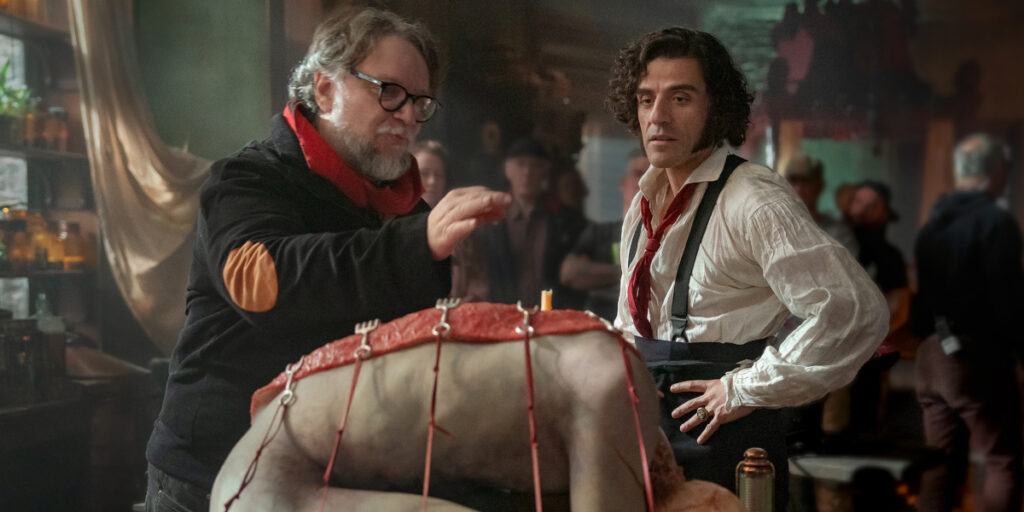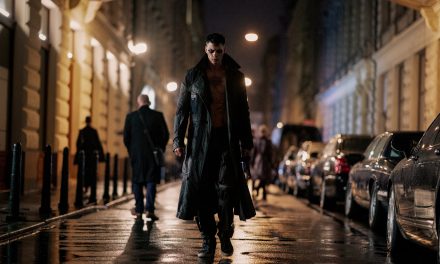Guillermo del Toro has always been enamored by the story of Frankenstein, describing James Whale’s 1931 masterpiece as a formative experience. You can see its fingerprints all over his career. Misunderstood, sympathetic monsters (in Hellboy, the tragic ghosts of Crimson Peak, The Shape of Water). Power-hungry madmen (Rasputin, Prince Nuada, Captain Vidal). The complex relationship between a creator and his creation (Pinocchio), or a creator washing his hands of the monster he creates (Nightmare Alley). It’s high time the auteur has taken his own spin on the property, and Frankenstein surely feels like the culmination of a long marination on these elements. It’s one of del Toro’s most gorgeous, complex productions yet, and an exceptional genre outing that’s one of the year’s finest films.
Guillermo del Toro’s interpretation stars Oscar Isaac as Victor Frankenstein, a narcissistic scientist whose loss of his mother fuels a lifelong effort to seize command over life and death out of the hands of God. Years after his father, Baron Leopold Frankenstein (Charles Dance), has passed, Victor reunites with his estranged brother William (Felix Kammerer) due to the latter’s forthcoming marriage to the ethereal Elizabeth Harlander (Mia Goth), whom Victor falls for. He finds a partner in crimes against nature with Henrich Harlander (Christoph Waltz), Elizabeth’s uncle, who has a massive cache of resources and wants Victor to succeed in creating new life. With those resources and his surgical skill, he creates the Creature (Jacob Elordi), a massive undead man who, in Victor’s care, can barely speak. What’s going to come from this violation of the natural order?
Jacob Elordi Delivers The Best Performance of His Career in Frankenstein
First and foremost, Frankenstein boasts a stellar cast turning in extraordinary work across the board. Oscar Isaac is extraordinary as the obsessive doctor with a God complex and daddy issues to match. He’s monomaniacal and egotistical but wounded, intense but desirous of something else with Elizabeth: he delivers a multifaceted, top-shelf performance. Mia Goth is otherworldly as Elizabeth, a shining light with a surplus of warmth and a curious fascination with the macabre. As the Creature, Jacob Elordi delivers an unforgettable powerhouse of a performance. He’s intimidating but innocent, inhuman but so humane and empathetic. In projects like Euphoria, Priscilla, and Saltburn, Elordi has already given multifaceted and very distinct performances, but the subtlety he delivers in Frankenstein makes it his finest performance yet, and one of the best of the year.

Guillermo del Toro’s filmography is full of immaculate production and gorgeous buildings and landscapes, from the decrepit mansion of Crimson Peak to the lustrous buildings of the Hellboy franchise, or the beautiful watery landscapes of The Shape of Water. Frankenstein boasts some of del Toro’s most immaculate settings and cinematography yet. Victor Frankenstein’s magnificent castle, the sparse, icy landscape where the Creature pursues Victor, and the various sordid Gothic labs are all immaculately constructed and smartly shot. The various other elements of the labs, from experimental corpses to other sordid lab elements. It’s one of the most beautiful films of the year, in addition to boasting stellar costume work and immaculate makeup for Jacob Elordi’s creature.
Guillermo del Toro’s Frankenstein is A Gothic Horror Masterpiece
Frankenstein takes some minor liberties with how it handles Mary Shelley’s influential source material, but all within the spirit of the sci-fi horror classic. It handles the story of the Creature and his complex, toxic relationship to creator Victor Frankenstein with care, while also giving voice to the Creature’s personhood and emotions better than any adaptation in some time. Where it struggles most is in building Elizabeth’s role in the film towards a satisfying end. It’s difficult to address these elements without spoiling the finale, but Elizabeth ties deeply into the Creature’s growing self-understanding.
She’s important, but her conclusion seems a bit abrupt and anticlimactic, not quite having sufficient impact in how the Creature’s story wraps. Additionally, the Creature makes repeated comments on wanting a companion to assuage his feelings over regrettable immortality, a thematic element that ties well into the novel but which is essentially dropped here. These are small quibbles, however, for a film that otherwise does a lot right.

These issues aside, del Toro’s adaptation of the story that sparked his career is a masterful outing from a filmmaker at the peak of his powers. It’s gorgeous, atmospheric, and immersive. Oscar Isaac transforms into one of the best interpretations of Victor Frankenstein we’ve seen onscreen, while Jacob Elordi is astounding in his transformation into the Creature. Layered, subtle, empathetic, and yet powerful, it’s a magnificent portrayal. The script tackles the complexity of the relationship between monster and man well, alongside the perverse father-son relationship between the mad creator and his monstrous progeny, both themes that tie into del Toro’s continuous explorations of otherness and self-understanding. It’s an incredible outing, and one of the year’s finest.
Frankenstein hits select theaters today, October 17, 2025, before its debut on Netflix on November 7, 2025.
For more on Horror, make sure to check out Fright-A-Thon.

![Guillermo del Toro’s Frankenstein Is Alive With Gothic Horror Mastery [Review]](http://18.211.146.234/wp-content/uploads/2025/10/1d3fc419-2ff3-463e-af2e-20d9645dbf28-1280x640.jpg)



![‘Avatar 3’ Is Now Titled ‘Avatar: Fire And Ash’ [D23 2024]](http://18.211.146.234/wp-content/uploads/2022/11/2365_0110_v0409.1183_altered_v01-440x264.jpg)